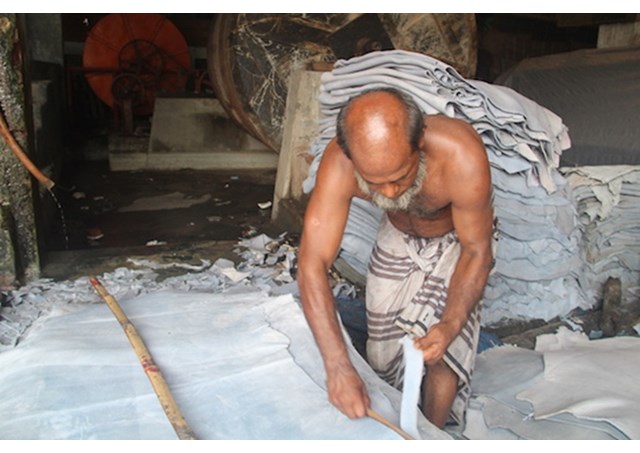
Bangladesh Supreme Court pushes Dhaka tanneries out

(Vatican Radio) Environmental activists have hailed the Bangladesh Supreme Court for ordering Dhaka's billion-dollar tannery industry to move out of the capital city.
On Sunday, the three-member bench led by Chief Justice Surendra Kumar Sinha ordered the shutting down of 155 tanneries in Dhaka, and dismissed the petition challenging the court's decision, filed by Bangladesh Finished Leather, Leather Goods and Footwear Exporters Association for a stay on an earlier High Court order.
The court ordered the tanneries to shut operations by March 31 and asked ministries of industries and environment as well police to ensure implementation of the order by cutting water, gas and electricity supplies by the deadline. The court's verdict came following a petition by the Bangladesh Environmental Lawyers' Association (BELA).
Bangladesh's tannery industry, centered in the Hazaribagh neighborhood next the Buriganga River, consists of 155 factories and employs about 30,000 workers. The industry earns more than US$1 billion annually from leather and finished leather goods exports, mostly to European markets.
However, the industry is blamed for massive environmental and public health problems. Theophil Nokrek, secretary of Catholic bishops' Justice and Peace Commission hailed the "landmark" court verdict for insisting on environmental protection and labor rights.
"All the concerned parties including the government and owners need to be sincere and aware about environmental protection in the new site, so that it doesn't turn into a second Hazaribagh with regards to pollution," Nokrek told ucanews.com.
"Workers are worried about their accommodation and other facilities in the new place. The owners can offer them what they need and the government must pressurize owners to ensure all the facilities for the workers are received," he said.
In a 2012 report Human Rights Watch documented serious health repercussions to tannery workers and local residents as well as environmental pollution caused by this mostly unregulated industry.
Amid pressure from foreign buyers and multiple warnings from the Bangladesh High Court, the government decided to relocate the industry to Savar, just outside Dhaka, in 2003, acquiring about 81 hectares for the project.
For years, the process stalled due to wrangling over compensation packages and construction issues.
"Tannery owners buy rawhides and machines cheaply and exploit cheap labor but make huge profits, degrading the environment and public health and they have [polluted] Buriganga River. If they move to the new industrial estate they need to invest in modern equipment and infrastructure which they are reluctant to pay for," said Syeda Rizwana Hasan, chief executive of Bangladesh Environment Lawyers' Association, who filed the petition to push the tanners out.
Syeda Rizwana Hasan also told the media on Monday that in October 2010, the High Court gave six months time for the tanneries to move from Hazaribagh, which expired in April 2001. But the government extended it to Mar 31 this year.
Mizanur Rahman, vice-president of Bangladesh Tanners' Association, said they would act according to court order.
"We must obey the court order and move to Savar. We have been appealing to our prime minister to ensure some facilities for us including relocation costs, low interest back loans and easy access to utility services," Rahman, owner of Helena Enterprise Tannery told ucanews.com.
"We are concerned about the environment. If the issue of pollution surfaces again, we might lose our buyers and this industry will be destroyed," he added.
The owners also say the proposed new location does not have the facilities they need. "The water treatment plant and waste management plant are not ready yet," tannery owners' association spokesman Tipu Sultan told AFP.
"Many people will lose their jobs if the shutdown goes ahead. The court should reconsider its decision." Leather and leather goods are the country's second-largest exports after garments.
But the government says the tanneries dump 22,000 cubic litres of toxic liquid waste including the cancer-causing toxin hexavalent chromium into the Buriganga every day. The indiscriminate disposal is destroying the nearby environment leaving the area contaminated with high amounts of hazardous sodium and other heavy metals.
In 2013 the New York-based Blacksmith Institute put Hazaribagh, where most are located, in a list of the top 10 most polluted places on earth and said residents faced elevated rates of skin and respiratory diseases.
Human Rights Watch says the tanneries employ workers as young as 11, and that many become ill because of exposure to hazardous chemicals. Environmental activists have often accused the vast majority of tanneries in Bangladesh of not using any effluent treatment plants, particularly tanneries in Hazaribagh.
The High Court also told the Department of Environment to ensure all the tanneries at Hazaribagh are relocated immediately. The home secretary, industries secretary, Bangladesh Police chief and Dhaka Metropolitan Police chief had been asked to extend all necessary cooperation. It has also instructed the Department of Environment chief to file an update over the matter by Apr 6.
(bdnews24.com; UCANews.com; Deccan Chronicle)
| All the contents on this site are copyrighted ©. |


